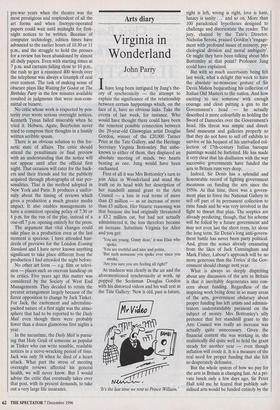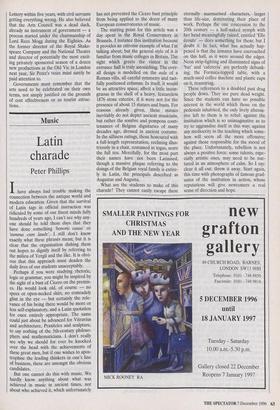Arts diary
Virginia in Wonderland
John Parry
have long been intrigued by Jung's the- ory of synchronicity — the attempt to explain the significance of the relationship between certain happenings which, on the face of it, have no obvious links. Take the events of last week, for instance. Who would have thought there could have been the remotest possible connection between the 29-year-old Glaswegian artist Douglas Gordon, winner of the £20,000 Turner Prize at the Tate Gallery, and the Heritage Secretary Virginia Bottomley. But unbe- known to either of them, they displayed an absolute meeting of minds, two hearts beating as one. Jung would have been enchanted.
First of all it was Mrs Bottomley's turn to join Alice in Wonderland and stand the truth on its head with her description of her standstill annual grant to the Arts Council — a loss in real terms of more than /5 million — as an increase of more than £3 million. Her bizarre reasoning was that because she had originally threatened a £3.2 million cut, but had not actually administered it, the loss therefore became an increase. Substitute Virginia for Alice and you get:
'You are young, Ginny dear,' it was Elsie who spoke, 'You are truthful and nice and polite, 'But such nonsense you spoke ever since you awoke, 'Are you sure you are feeling all right?'
As madness was clearly in the air and the aforementioned synchronicity at work, up popped the Scotsman Douglas Gordon with his distorted videos and his wall text at the Tate Gallery: 'New is old, past is future, 'It's the last time we rent to Prince William.' right is left, wrong is right, love is hate, lunacy is sanity . .' and so on. More than 100 paradoxical hypotheses designed to challenge and disorientate the reader. The jury, chaired by the Tate's Director, Nicholas Serota, praised Gordon's 'engage- ment with profound issues of memory, psy- chological division and moral ambiguity'. Or might they have been talking about Mrs Bottomley at that point? Professor Jung could have explained.
But with so much uncertainty being felt last week, what a delight this week to have the absolute no-nonsense gesture of Sir Denis Mahon bequeathing his collection of Italian Old Masters to the nation. And how exciting to see someone with enough courage and clout putting a gun to the Government's head — he actually described it more colourfully as holding the Sword of Damocles over the Government's head. His threat was simple and direct: fund museums and galleries properly so that they do not have to sell off exhibits to survive or his bequest of his unrivalled col- lection of 17th-century Italian baroque paintings would be forfeited. He has made it very clear that his disillusion with the way successive governments have funded the arts in Britain runs very deep.
Indeed, Sir Denis has a splendid and honourable record of fighting government meanness on funding the arts since the 1950s. At that time, there was a govern- ment plan to force the National Gallery to sell off part of its permanent collection to raise funds and he was very involved in the fight to thwart that plan. The sceptics are already predicting, though, that his scheme will be foiled by a future government and may not even last the short term, let alone the long term. Sir Denis's long anti-govern- ment battle has never been party political. And, given the noises already emanating from the likes of Jack Cunningham and Mark Fisher, Labour's approach will be no more generous than the Tories' if the Gov- ernment should change next year.
What is always so deeply dispiriting about any discussion of the arts in Britain is that it inevitably degenerates into con- cern about funding. Regardless of the inspiring work being done in so many areas of the arts, government obduracy about proper funding has left artists and adminis- trators understandably paranoid on the subject of money. Mrs Bottotnley's silly pretence that her standstill grant to the Arts Council was really an increase was actually quite unnecessary. Given the financial context she was working in, she realistically did quite well to hold the grant steady for another year — even though inflation will erode it. It is a measure of the real need for proper funding that she felt so desperately defensive.
But the whole system of how we pay for the arts in Britain is changing fast. At a pri- vate lunch only a few days ago, Sir Peter Hall told me he feared that publicly sub- sidised arts would be funded entirely by the Lottery within five years, with civil servants getting everything wrong, He also believed that the Arts Council was a dead duck, already an instrument of government — a process started under the chairmanship of Lord Rees Mogg during the Eighties. As the former director of the Royal Shake- speare Company and the National Theatre and director of potentially the most excit- ing privately sponsored season of a dozen new productions at the Old Vic in London next year, Sir Peter's voice must surely be paid attention to.
Governments must remember that the arts need to be celebrated on their own terms, not simply justified on the grounds of cost effectiveness or as tourist attrac- tions.



















































































 Previous page
Previous page